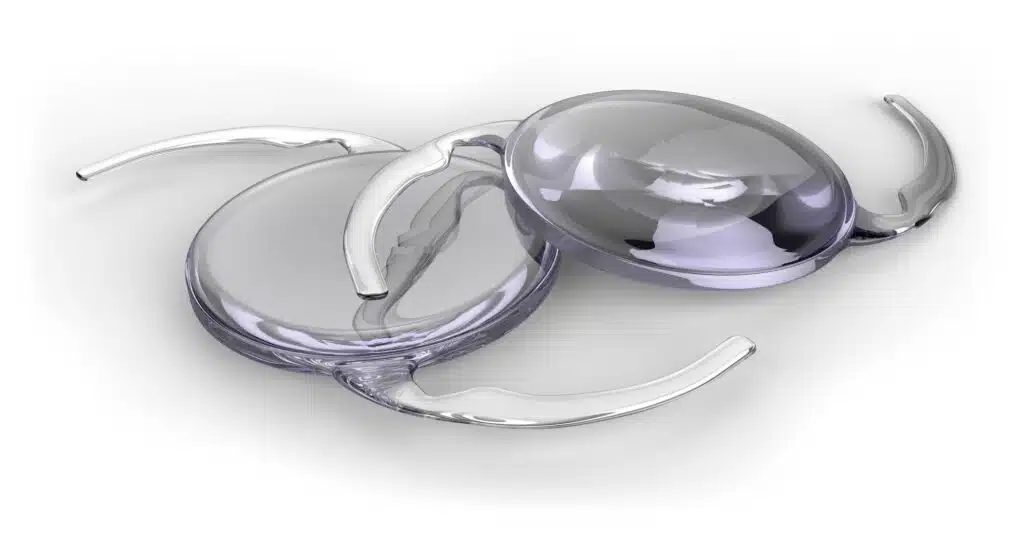Monofocal Lens – IOL Implants
Monofocal intraocular lenses (monofocal IOLs) are custom lens implants that are used in cataract surgery and refractive lens replacement surgery. These lenses are designed to improve vision problems by correcting for refractive error, or the way that light is bent as it enters your eye.
If you have a monofocal IOL implanted, you may still need to wear glasses or contact lenses for activities like reading or driving. However, many patients find that their overall vision is significantly improved after surgery. Monofocal IOLs are just one type of lens implant available today. Talk to your doctor at Berkeley Eye Center about which option is right for you.
Table of Contents
What Is a Monofocal Lens?
These lenses provide sharp vision correction to correct nearsightedness or farsightedness.
There is only one focusing distance, and it can be set to focus for up close, medium range, or distance vision. The majority of people have theirs set for clear distance vision. This requires them to typically wear eyeglasses for reading.

Pros:
- Monofocal lenses are typically covered by insurance for cataract surgery.
- Their long 50-year history guarantees reliable, well manufactured lenses.
- Everyone is a suitable candidate for monofocal lenses.
Cons:
- They provide only one point of focus, so glasses may be necessary for other uses.
The Difference Between Monofocal IOL and a Multifocal IOL
If you have recently been diagnosed with a cataract or presbyopia and your doctor provided you with the option of a monofocal IOL or a multifocal IOL, then you may be wondering what the difference is.
- A monofocal IOL provides excellent vision at far or near distances, but not both.
- A multifocal IOL achieves near, intermediate and far distance vision simultaneously through several concentric rings working together. This allows readers to better adjust their focus while using their eyes.
The Disadvantages of Monofocal IOLs Implants
Monofocal IOLs (intraocular lenses) are a popular treatment to address cataracts or presbyopia, however they come with some drawbacks. Monofocal lenses replace the natural lens in your eye. While they allow you to focus on objects that are up close or far away, they cannot do both at the same time.
This means that if monofocal IOLs are used then correction for distance vision will be necessary for engaging in certain activities. These activities include reading or using digital devices at arm’s length.
Moreover, monofocal patients may also experience night-time or low light vision issues due to their ‘fixed’ focus. Thankfully advances have been made in intraocular lens technology. There are now alternatives with higher levels of customization depending on the situation.
Monofocal IOL FAQs
Will You Need Glasses After Monofocal Cataract Surgery?
After cataract removal, patients can have clear vision with a monofocal lens at a fixed distance, such as for driving. However, they may need glasses to see clearly up close or mid-ranges.
Patients may choose to have a more complex lens, such as a multifocal lens. Multifocal lenses provide clear vision at multiple distances and can reduce the need to wear glasses. However, these lenses can be more expensive.
Add Image
How Much Does Monofocal Lens Cataract Surgery Cost?
Medicare typically covers the cost of a standard monofocal intraocular lens (IOL) for cataract surgery. There are other types of IOLs available, such as multifocal IOLs and toric IOLs. These IOLs can provide better vision than standard monofocal IOLs, but they are not covered by Medicare.
Consult With an Experienced Cataract Surgeon at Berkeley Eye Center
Choosing the right lens for cataract surgery is an important decision that can have a major impact on your vision and quality of life. It is important to talk to your eye doctor to weigh the pros and cons of the different lenses available and to get advice on which one is best suited to your lifestyle and vision needs.
At Berkeley Eye Center, we are proud to have some of the most experienced and knowledgeable cataract specialists and surgeons in the area. Our team can provide you with the information and guidance you need to make an informed decision about your cataract surgery. If you are considering cataract surgery, contact us today to schedule a consultation. We will be happy to answer any of your questions and discuss the different lens options available to you.
Client Reviews



